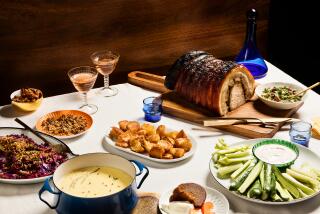Diabetics May Make Merry, in Moderation
- Share via
For the 16 million Americans with diabetes, holiday celebrations are too often marred by worry and guilt over indulging in the temptations so plentiful on party platters and buffet tables this time of year. But the good news is, you can have your fruitcake and eat it too.
Remember, you control your diabetes, it doesn’t control you. Having diabetes does not mean you have to pass on the traditional foods and festivities that make this season so enjoyable, as long as you practice the principles so important year-round: moderation, balance and variety. Even though you can take a holiday, your diabetes never does.
The point to bear in mind is that you can eat anything you want, as long as it is substituted for an equivalent food. You can even enjoy a holiday toast--moderate amounts of alcohol are allowed. The goal is to eat sensibly without “splurging.” Don’t throw out all your healthy habits, thinking you’ll “be good” again after the holidays. A sensible approach to eating will allow you to enjoy your favorite foods without jeopardizing your health.
People often ask for a general diet to follow, but these days diets are tailored to the individual. The American Diabetes Assn. no longer recommends a specific diet. Instead, there are guidelines for “medical nutritional therapy,” as we now call the dietary advice provided to people with diabetes. This approach involves defining healthy food choices on an individual basis. Dietitians work with patients to determine how to incorporate the necessary amounts of fat, carbohydrates and protein into their menus. Gone are the days of regimented diet plans filled with boring, repetitive meals.
Today, people with diabetes can take charge of their own lives. Health-care professionals play an important role in providing the necessary education and tools to control diabetes on a daily basis. However, people with diabetes are responsible for more than 95% of self-care. With their learned skills, they should feel confident to confront the particular challenges that the holidays, vacations and social occasions present.
Diabetes is a metabolic disorder that affects the way the body uses and stores glucose, a form of sugar. The best advice for people with the disease is to avoid an overabundance of sugar-laden desserts and rich foods and follow an exercise routine.
Exercise greatly improves the body’s sensitivity to circulating insulin, which leads to lower blood glucose levels. It also helps people with diabetes to reach and maintain an optimal weight, thereby decreasing their risk of cardiovascular disease. And physical activity helps reduce blood pressure and blood fats.
Following a normal routine at this time of year can require extra discipline. It helps to consider each “holiday” day a “normal” day, which means eating regular meals, testing blood glucose levels regularly, maintaining an exercise program while still enjoying all the season has to offer.
During the holidays, people with diabetes should keep these thoughts in mind:
* Follow a regular exercise routine to help regulate metabolism. Don’t have an hour to spare? Try 10- or 15-minute brisk walks at intervals throughout the day. Remember, after a holiday meal, to wait 60 to 90 minutes before taking your walk to allow for proper digestion.
* Enjoy those special holiday foods in moderation. Pass on the everyday items like crackers and dip. Instead, take limited amounts of the special treats you particularly enjoy. A small portion is less likely to upset blood sugar levels.
* At parties and other social events, gravitate toward the veggies and fresh fruit.
* Take extra care to be certain that your meals are nutritious, varied and balanced. If you do have a treat, make sure it is just a substitute for an equivalent item in your regular menu.
* If you partake of holiday cheer, keep moderation in mind. You may consider reducing some of your carbohydrate intake when you drink alcohol, but be particularly aware of the potential for subsequent low blood sugar levels that may occur many hours after alcohol consumption, especially in people taking insulin injections. Do not be reckless; consult your physician. The American Diabetes Assn. defines moderation as two drinks a day for men and one drink a day for women. A drink is a 5-ounce glass of wine, a 12-ounce light beer, or 1 1/2 ounces of 80-proof distilled spirits. Some medications preclude drinking alcohol, so again check with your doctor.
* When shopping for your holiday meals, be wary of products labeled “diet” at the supermarket. These are not necessarily designed for people with diabetes. Similarly, special “diabetic” foods are not necessary, unless you really enjoy them. They also tend to cost more. Stick to natural, wholesome foods that are prepared in a healthful manner.
* Remember to monitor your blood glucose levels, and be sure you don’t skip meals.
* Be positive. Remember that you’re in control of your diabetes, not the other way around.
And above all, don’t panic. Enjoying the holidays while maintaining good health is easier than you think--even for people with diabetes.
Dr. Philip Barnett is director of the Comprehensive Diabetes Outpatient Program, Cedars-Sinai Medical Center.
(BEGIN TEXT OF INFOBOX / INFOGRAPHIC)
Teaching Them How to Stay in Control
The Comprehensive Diabetes Outpatient Program was recognized again this year by the American Diabetes Assn. for excellence in diabetes education. A major focus of the program’s education efforts is empowering patients to manage their disease by teaching self-care skills that enable them to confidently make decisions regarding control of their diabetes on a daily basis.
For more information, call (310) 855-3870.






